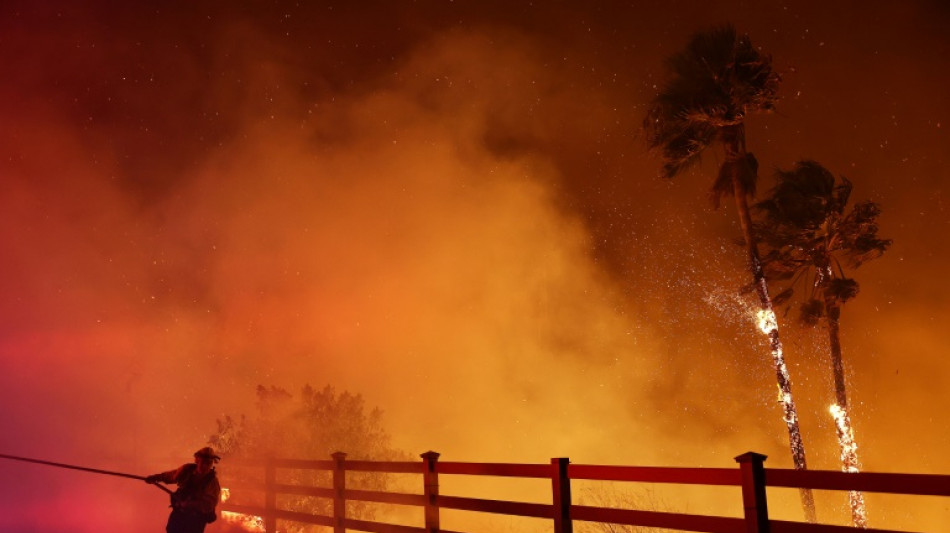
-
 Villa heap pain on slumping Man City as Forest soar
Villa heap pain on slumping Man City as Forest soar
-
Suspect in deadly Christmas market attack railed against Islam and Germany

-
 At least 32 die in bus accident in southeastern Brazil
At least 32 die in bus accident in southeastern Brazil
-
Freed activist Paul Watson vows to 'end whaling worldwide'

-
 Chinese ship linked to severed Baltic Sea cables sets sail
Chinese ship linked to severed Baltic Sea cables sets sail
-
Sorrow and fury in German town after Christmas market attack

-
 Guardiola vows Man City will regain confidence 'sooner or later' after another defeat
Guardiola vows Man City will regain confidence 'sooner or later' after another defeat
-
Ukraine drone hits Russian high-rise 1,000km from frontline

-
 Villa beat Man City to deepen Guardiola's pain
Villa beat Man City to deepen Guardiola's pain
-
'Perfect start' for ski great Vonn on World Cup return

-
 Germany mourns five killed, hundreds wounded in Christmas market attack
Germany mourns five killed, hundreds wounded in Christmas market attack
-
Odermatt soars to Val Gardena downhill win

-
 Mbappe's adaptation period over: Real Madrid's Ancelotti
Mbappe's adaptation period over: Real Madrid's Ancelotti
-
France's most powerful nuclear reactor finally comes on stream

-
 Ski great Vonn finishes 14th on World Cup return
Ski great Vonn finishes 14th on World Cup return
-
Scholz visits site of deadly Christmas market attack

-
 Heavyweight foes Usyk, Fury set for titanic rematch
Heavyweight foes Usyk, Fury set for titanic rematch
-
Drone attack hits Russian city 1,000km from Ukraine frontier

-
 Former England winger Eastham dies aged 88
Former England winger Eastham dies aged 88
-
Pakistan Taliban claim raid killing 16 soldiers

-
 Pakistan military courts convict 25 of pro-Khan unrest
Pakistan military courts convict 25 of pro-Khan unrest
-
US Congress passes bill to avert shutdown

-
 Sierra Leone student tackles toxic air pollution
Sierra Leone student tackles toxic air pollution
-
German leader to visit site of deadly Christmas market attack

-
 16 injured after Israel hit by Yemen-launched 'projectile'
16 injured after Israel hit by Yemen-launched 'projectile'
-
Google counters bid by US to force sale of Chrome

-
 Russia says Kursk strike kills 5 after Moscow claims deadly Kyiv attack
Russia says Kursk strike kills 5 after Moscow claims deadly Kyiv attack
-
Cavaliers cruise past Bucks, Embiid shines in Sixers win

-
 US President Biden authorizes $571 million in military aid to Taiwan
US President Biden authorizes $571 million in military aid to Taiwan
-
Arahmaiani: the Indonesian artist with a thousand lives

-
 Indonesians embrace return of plundered treasure from the Dutch
Indonesians embrace return of plundered treasure from the Dutch
-
Qualcomm scores key win in licensing dispute with Arm

-
 Scientists observe 'negative time' in quantum experiments
Scientists observe 'negative time' in quantum experiments
-
US approves first drug treatment for sleep apnea

-
 US drops bounty for Syria's new leader after Damascus meeting
US drops bounty for Syria's new leader after Damascus meeting
-
Saudi man arrested after deadly car attack on German Christmas market

-
 'Torn from my side': horror of German Christmas market attack
'Torn from my side': horror of German Christmas market attack
-
Bayern Munich rout Leipzig on sombre night in Germany

-
 Tiger in family golf event but has 'long way' before PGA return
Tiger in family golf event but has 'long way' before PGA return
-
Pogba wants to 'turn page' after brother sentenced in extortion case

-
 Court rules against El Salvador in controversial abortion case
Court rules against El Salvador in controversial abortion case
-
French court hands down heavy sentences in teacher beheading trial

-
 Israel army says troops shot Syrian protester in leg
Israel army says troops shot Syrian protester in leg
-
Tien sets-up all-American NextGen semi-final duel

-
 Bulked-up Fury promises 'war' in Usyk rematch
Bulked-up Fury promises 'war' in Usyk rematch
-
Major reshuffle as Trudeau faces party pressure, Trump taunts

-
 Reggaeton star Daddy Yankee in court, says wife embezzled $100 mn
Reggaeton star Daddy Yankee in court, says wife embezzled $100 mn
-
Injured Eze out of Palace's clash with Arsenal

-
 Norway's Deila named coach of MLS Atlanta United
Norway's Deila named coach of MLS Atlanta United
-
Inter-American Court rules Colombia drilling violated native rights


Scientists struggle to explain record surge in global heat
The world has been getting hotter for decades but a sudden and extraordinary surge in heat has sent the climate deeper into uncharted territory -- and scientists are still trying to figure out why.
Over the past two years, temperature records have been repeatedly shattered by a streak so persistent and puzzling it has tested the best-available scientific predictions about how the climate functions.
Scientists are unanimous that burning fossil fuels has largely driven long-term global warming, and that natural climate variability can also influence temperatures one year to the next.
But they are still debating what might have contributed to this particularly exceptional heat surge.
Experts think changes in cloud patterns, airborne pollution, and Earth's ability to store carbon could be factors, but it would take another year or two for a clearer picture to emerge.
"Warming in 2023 was head-and-shoulders above any other year, and 2024 will be as well," said Gavin Schmidt, director of the NASA Goddard Institute for Space Studies, in November.
"I wish I knew why, but I don't," he added.
"We're still in the process of assessing what happened and if we are seeing a shift in how the climate system operates."
- 'Uncharted territory' -
When burned, fossil fuels emit greenhouse gases like carbon dioxide that trap heat near the Earth's surface.
As fossil fuel emissions have risen to record highs in 2023, average sea surface and air temperatures have curved upwards in a consistent, decades-long warming trend.
But in an unprecedented streak between June 2023 and September 2024, global temperatures were unlike anything seen before, said the World Meteorological Organization -- and sometimes by a considerable margin.
The heat was so extreme it was enough to make 2023 -- and then 2024 -- the hottest years in history.
"The record global warmth of the past two years has sent the planet well into uncharted territory," Richard Allan, a climate scientist from the UK's University of Reading, told AFP.
What occurred was "at the limit of what we would expect based on existing climate models", Sonia Seneviratne, a climatologist from ETH Zurich in Switzerland, told AFP.
"But the overall long-term warming tendency is not unexpected" given the amount of fossil fuels being burned, she added.
- 'Difficult to explain' -
Scientists said that climate variability could go some way to explaining what happened.
2023 was preceded by a rare, three-year La Nina phenomenon that had a strong cooling effect on the planet by pushing excess heat into the deep oceans.
This energy was released back to the surface when an opposite, warming El Nino event took over in mid-2023, boosting global temperatures.
But the heat has lingered even after El Nino peaked in January.
Temperatures have not fallen as fast as they rose, and November was still the second-warmest on record.
"It is difficult to explain this at the moment," said Robert Vautard, a member of the UN's climate expert panel IPCC. "We lack a bit of perspective.
"If temperatures do not drop more sharply in 2025, we will really have to ask ourselves questions about the cause," he told AFP.
- Jury out -
Scientists are looking for clues elsewhere.
One theory is that a global shift to cleaner shipping fuels in 2020 accelerated warming by reducing sulphur emissions that make clouds more mirror-like and reflective of sunlight.
In December, another peer-reviewed paper looked at whether a reduction in low-lying clouds had let more heat reach Earth's surface.
At the American Geophysical Union conference this month, Schmidt convened scientists to explore these theories and others, including whether solar cycles or volcanic activity offered any hints.
There are concerns that without a more complete picture, scientists could be missing even more profound and transformational shifts in the climate.
"We cannot exclude that some other factors also further amplified the temperatures... the verdict is still out," said Seneviratne.
Scientists this year warned that Earth's carbon sinks -- such as the forests and oceans that suck CO2 from the atmosphere -- had suffered an "unprecedented weakening" in 2023.
This month, the US National Oceanic and Atmospheric Administration said the Arctic tundra, after locking away C02 for millennia, was becoming a net source of emissions.
Oceans, which have acted as a massive carbon sink and climate regulator, were warming at a rate scientists "cannot fully explain", said Johan Rockstrom of the Potsdam Institute for Climate Impact Research.
"Could this be a first sign of a planet starting to show a loss of resilience? We cannot exclude it," he said last month.
C.Amaral--PC




